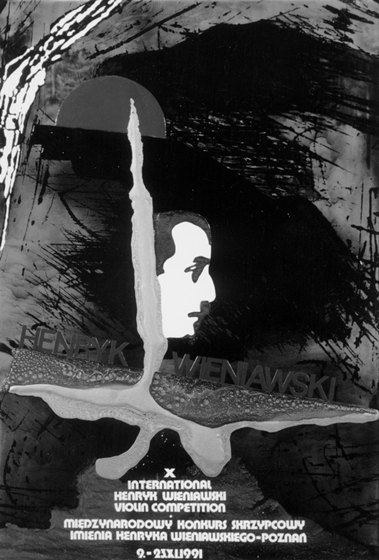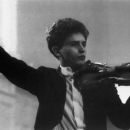10th International Henryk Wieniawski Violin Competition
Poznań, 9-23 November 1991
Watch a documentary about the competition:
The event's 10th edition was the first to be held in the new political reality. Elected President of the Republic of Poland, the symbol of the change, Lech Wałęsa, followed in his pre-war predecessor’s footsteps, and — like Ignacy Mooecicki in 1935 — took patronage over the 1991 Wieniawski Competition, as well as founded its main prize. Attracted by the names of such world-famous artists as Wanda Wiłkomirska, Konstanty Andrzej Kulka, Roman Totenberg, or Grigory Zhyslin, who were to sit on the jury, a record-breaking number of candidates sent in their applications. After 25 years it was also the last event in the career of Edmund Grabkowski, who, despite having already handed over his post to Zdzisław Dworzecki, agreed to manage the tournament once again. And what a fortunate move that was! His help and experience proved invaluable when five weeks before the opening night, the Philharmonic was left without the director, and the competition without the conductor! One half of the dramatic dilemma was solved immediately by having Zdzisław Dworzecki (then Deputy Director of the Philharmonic) promoted to the directorial post. Prof. Jerzy Katlewicz, in turn, saved the organizers from the other, incomparably more difficult predicament. At the very last moment he agreed to prepare and conduct the opening concert, as well as accompany participants of the competition. The great artist was perhaps as much motivated by the feeling of responsibility for the cause of national culture, as this of attachment to the town to which he once devoted a few beautiful seasons of his work. And although everything around had changed, he returned to Poznań and his friends, and with typical vigour threw himself into the whirl of the competition work.
New times brought a new reality. Besides government’s subsidies, which was the main source of funding the event in the past, there opened new possibilities to gain financial assistance from local self-governments, and — a truly revolutionary novelty — from private donors and sponsors. All these resources were used very effectively. Made up of the then reappearing group of entrepreneurs, the Honorary Sponsor Committee rose to the occasion, and made it possible to extend the pool of valuable extra-statutory prizes, cover travelling expenses for the outstanding soloist who performed at the opening gala, shoot a TV film about Wieniawski, manufacture an ample amount of audio and video cassettes with his music, release two compact discs with historical recordings of the laureates, as well as record the entire event, for the first time using digital — in all probability Japanese-made — equipment.
It was from this country of state-of-the-art microprocessors and blossoming musical talents that the largest foreign party of violin players arrived for the Competition. Only the Polish national team for this bow duel was more numerous. Together, the two nations dominated the 10th Competition, while press reports of the event could easily — both in terms of titles and style — fit in the sports section. Eventually, it was the “Polish tandem” that won the race. Overnight, the organizers managed to fish some extra money for two joint first prizes. Everybody was pleased with the well-deserved success of the fine seventeen-year-olds and their teachers from Łódź and Poznań. Nevertheless, when emotions subsided, stubborn questions asked by the event’s more insightful observers returned: “What to do to make the Wieniawski Competition a truly international event, not a mere two-nation rivalry; how to finally prevent its world from shrinking?”.
source: R. Połczyński, Da Capo. 75 lat Międzynarodowych Konkursów im. Henryka Wieniawskiego
Read more about the 10th Competition (PDF, 640 KB) >

A poster of 10th edition of Wieniawski Violin Competition designed by B. Szlabs.
JURY MEMBERS
Chairman: Stanisław Wisłocki (Poland)
Zenon Brzewski (Poland)
Jens Ellerman (Germany)
Giorgio Ferrari (Italy
)
Michael Frischenschlager
(Austria)
Jadwiga Kaliszewska (Poland
)
Konstanty Andrzej Kulka (Poland)
Robert
Masters (Great Britain)
Igor Ozim (Slovenia)
Esztr Perenyi (Hungary)
Zenon Płoszaj
(Poland)
Manfred Scherzer (Germany)
Zoria Szichmurzajewa (Russia)
Roman
Totenberg (USA)
Yoshio Unno (Japan
)
Wanda Wiłkomirska (Poland)
Grigorij Żislin
(Russia)
PRIZE WINNERS
1st prize: Bartek
NIZIOŁ (Poland), Piotr PŁAWNER
(Poland)
2nd prize: Chie ABIKO
(Japan
)
3rd prize: Reiko SHIRAISHI
(Japan)
4th prize: Monika JARECKA
(Poland)
5th prize: Tomoko YOSHIMURA
(Japan)
Awards:
Jarosław Żołnierczyk
(Poland); Sebastian Gugała (Poland); Roland Orlik (Poland);
Eijin Nimura (Japan);
Ewa Pyrek (Poland); Erika Dobosiewicz (Poland)













